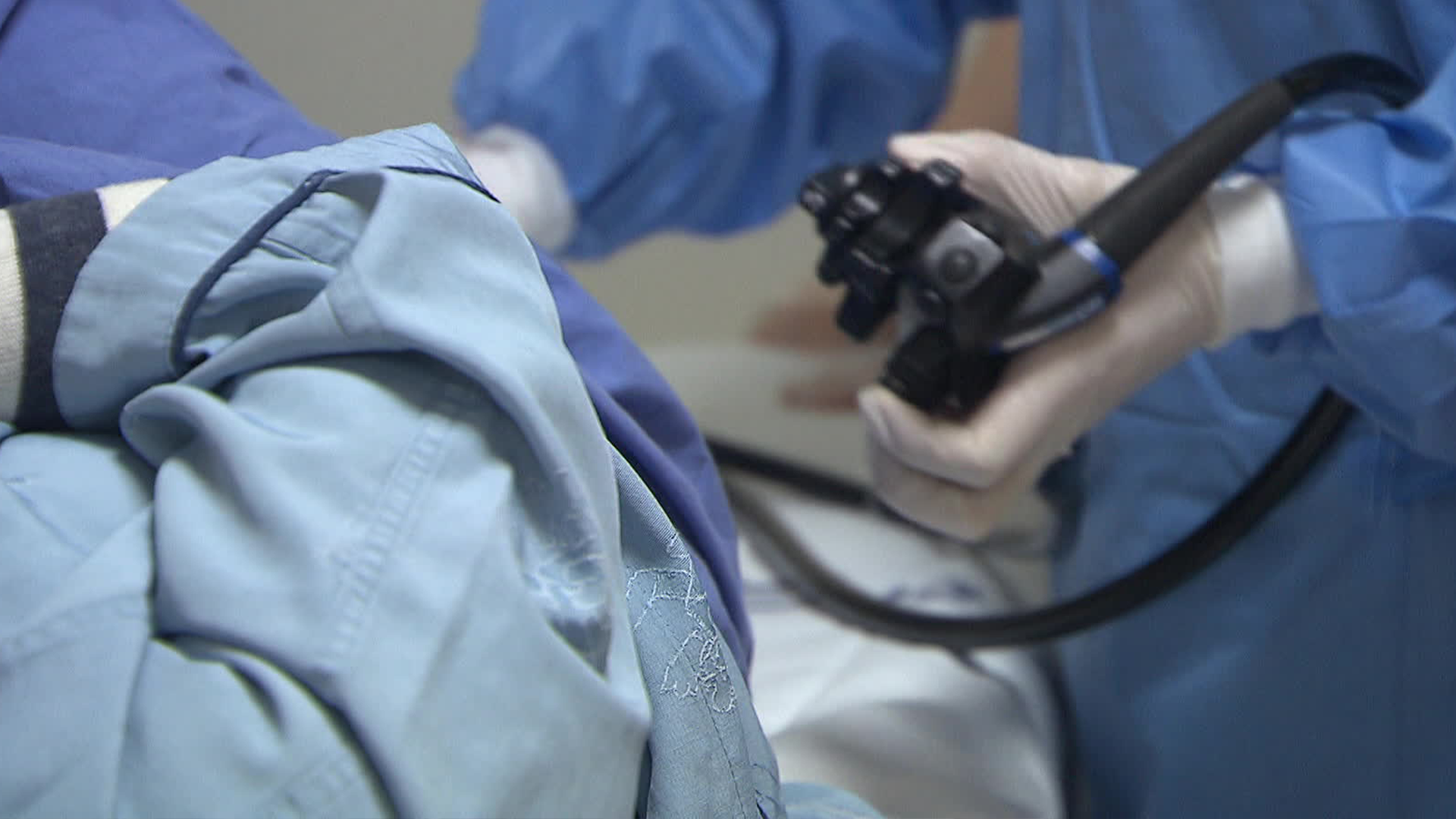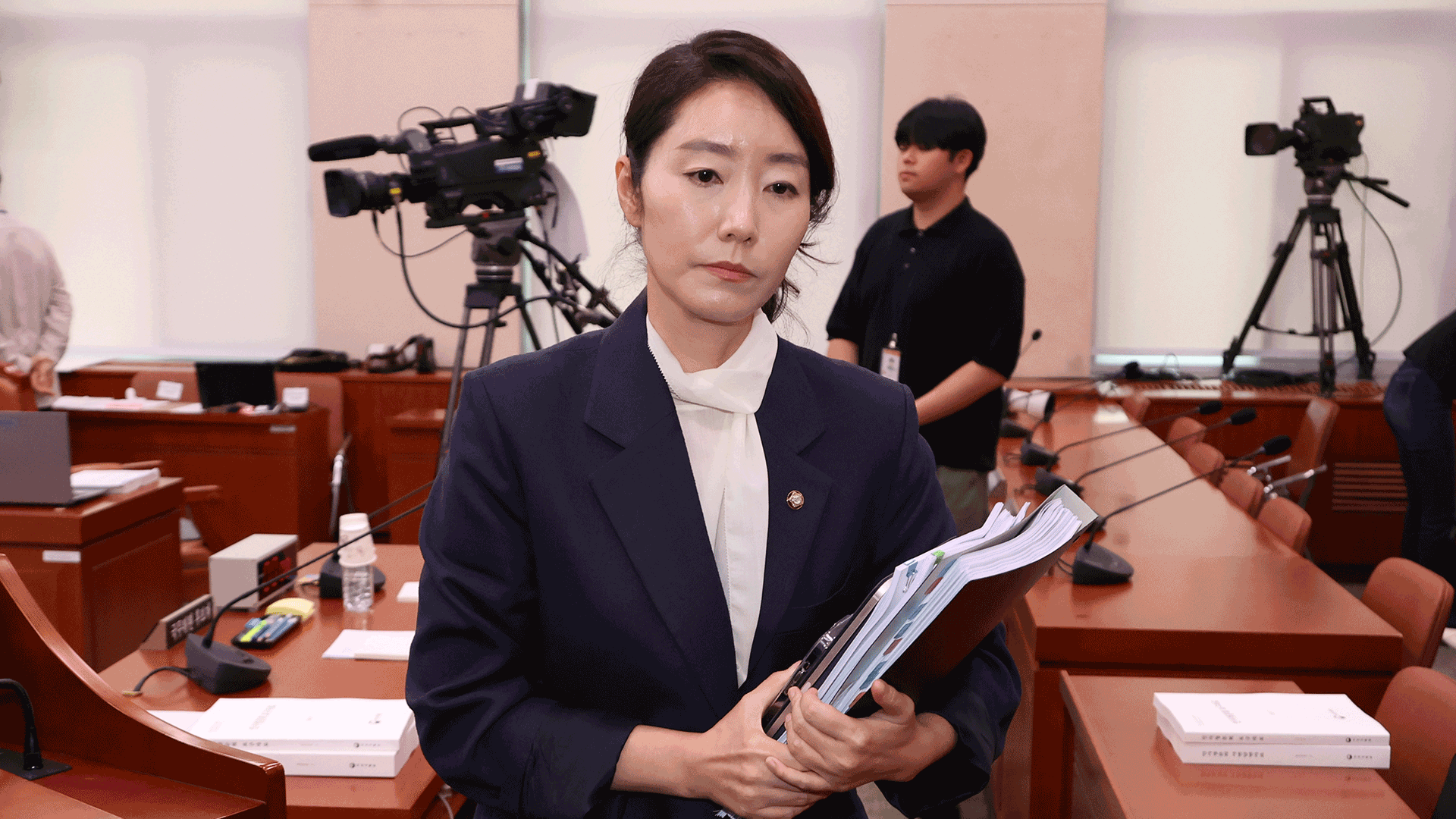Early screening for colorectal cancer
입력 2025.06.29 (03:18)
읽어주기 기능은 크롬기반의
브라우저에서만 사용하실 수 있습니다.
[Anchor]
For the past 30 years, cancer has been the leading cause of death among Koreans.
Over time, the gap with the second place has widened.
The number of cancer patients has increased nearly threefold from 100,000 in 1999, when statistics were first published, to 280,000.
You can see the red parts; as the population aged 65 and older increases, the number of cancer patients also rises. In fact, over the past 24 years, the total number of people diagnosed with cancer and are currently undergoing treatment or have been cured is 2.58 million, which is 1 in 20 citizens.
When narrowed down to those aged 65 and older, it increases to 1 in 7, with the proportion of those aged 65 and older exceeding half of all patients.
This means that as we age, cancer prevention and management become increasingly important.
Today (Jun. 28), we will report on colorectal cancer, known as the "silent cancer," and the importance of early screening.
Reporter Yoo Kwang-seok.
[Report]
This is a 58-year-old woman who recently underwent surgery for colorectal cancer.
Cancer was detected during her first-ever colonoscopy.
The biopsy results confirmed lymph node metastasis, leading to a diagnosis of stage 3 rectal cancer.
[Colorectal Cancer Patient/58 years old: "I didn't have noticeable symptoms like seeing blood in my stool or having diarrhea. Because of that, I think I neglected to get a colonoscopy."]
The length of the colon is about 150 cm, and it is a long tube-shaped organ where malignant tumors can occur in the cecum, colon, and rectum, which is known as colorectal cancer.
[Cho Yong-beom/Director of the Colorectal Cancer Center at Samsung Seoul Hospital: "A normal colon appears shiny when viewed through an endoscope, and the blood vessels are clearly visible. Polyps appear as protrusions. If these polyps are larger and spread wider, they are visually considered cancer."]
In 2022, the total number of cancer patients was over 280,000, with colorectal cancer accounting for 11.8% or 33,000 cases, making it the second most common after thyroid cancer.
The number of patients has increased by 239% compared to 1999.
Diets high in red meat and processed foods, along with a lack of exercise, are contributing to the rise in colorectal cancer patients.
[Cho Yong-beom/Director of the Colorectal Cancer Center at Samsung Seoul Hospital: "We recommend a colonoscopy after the age of 45 or 50, and if there is a family history or if polyps have been removed in the past, it is better to have a colonoscopy a bit earlier."]
The importance of early screening is clearly confirmed by statistics.
Colorectal cancer screening involves a fecal occult blood test, followed by a colonoscopy if there are abnormal findings, and the screening rate has significantly increased over the past 20 years.
As screenings have increased, the proportion of diagnoses made at localized stages, where the cancer has not spread beyond the organ, has also risen.
The 5-year relative survival rate for colorectal cancer is 74.6%, but it rises to 94% when diagnosed at localized stages.
In contrast, the survival rate at the stage of distant metastasis, where cancer cells have spread to other areas, is only 20.6%.
[Park Seong-chan/Director of the Colorectal Cancer Center at the National Cancer Center: "For those at risk of colorectal cancer, frequent colonoscopies can help quickly detect precursors to colorectal cancer, such as polyps. Treating them promptly is one of the good ways to prevent colorectal cancer."]
Eighty-one-year-old Lee Yeon-sook underwent surgery for colorectal cancer in 2000 when she was in her mid-50s.
Although it was stage 3 colorectal cancer, through surgery, chemotherapy, and subsequent dietary management and exercise, she has maintained a healthy life without recurrence for 25 years.
[Lee Yeon-sook/81 years old: "First of all, you need to keep your mind at ease. It's your own responsibility. So, I think it's important to approach everything calmly."]
The Ministry of Health and Welfare is considering including colonoscopy in the basic items of the national cancer screening program.
Colorectal cancer, which can easily spread without noticeable symptoms, has a higher survival rate the earlier it is detected and treated.
This is KBS News, Yoo Kwang-seok.
For the past 30 years, cancer has been the leading cause of death among Koreans.
Over time, the gap with the second place has widened.
The number of cancer patients has increased nearly threefold from 100,000 in 1999, when statistics were first published, to 280,000.
You can see the red parts; as the population aged 65 and older increases, the number of cancer patients also rises. In fact, over the past 24 years, the total number of people diagnosed with cancer and are currently undergoing treatment or have been cured is 2.58 million, which is 1 in 20 citizens.
When narrowed down to those aged 65 and older, it increases to 1 in 7, with the proportion of those aged 65 and older exceeding half of all patients.
This means that as we age, cancer prevention and management become increasingly important.
Today (Jun. 28), we will report on colorectal cancer, known as the "silent cancer," and the importance of early screening.
Reporter Yoo Kwang-seok.
[Report]
This is a 58-year-old woman who recently underwent surgery for colorectal cancer.
Cancer was detected during her first-ever colonoscopy.
The biopsy results confirmed lymph node metastasis, leading to a diagnosis of stage 3 rectal cancer.
[Colorectal Cancer Patient/58 years old: "I didn't have noticeable symptoms like seeing blood in my stool or having diarrhea. Because of that, I think I neglected to get a colonoscopy."]
The length of the colon is about 150 cm, and it is a long tube-shaped organ where malignant tumors can occur in the cecum, colon, and rectum, which is known as colorectal cancer.
[Cho Yong-beom/Director of the Colorectal Cancer Center at Samsung Seoul Hospital: "A normal colon appears shiny when viewed through an endoscope, and the blood vessels are clearly visible. Polyps appear as protrusions. If these polyps are larger and spread wider, they are visually considered cancer."]
In 2022, the total number of cancer patients was over 280,000, with colorectal cancer accounting for 11.8% or 33,000 cases, making it the second most common after thyroid cancer.
The number of patients has increased by 239% compared to 1999.
Diets high in red meat and processed foods, along with a lack of exercise, are contributing to the rise in colorectal cancer patients.
[Cho Yong-beom/Director of the Colorectal Cancer Center at Samsung Seoul Hospital: "We recommend a colonoscopy after the age of 45 or 50, and if there is a family history or if polyps have been removed in the past, it is better to have a colonoscopy a bit earlier."]
The importance of early screening is clearly confirmed by statistics.
Colorectal cancer screening involves a fecal occult blood test, followed by a colonoscopy if there are abnormal findings, and the screening rate has significantly increased over the past 20 years.
As screenings have increased, the proportion of diagnoses made at localized stages, where the cancer has not spread beyond the organ, has also risen.
The 5-year relative survival rate for colorectal cancer is 74.6%, but it rises to 94% when diagnosed at localized stages.
In contrast, the survival rate at the stage of distant metastasis, where cancer cells have spread to other areas, is only 20.6%.
[Park Seong-chan/Director of the Colorectal Cancer Center at the National Cancer Center: "For those at risk of colorectal cancer, frequent colonoscopies can help quickly detect precursors to colorectal cancer, such as polyps. Treating them promptly is one of the good ways to prevent colorectal cancer."]
Eighty-one-year-old Lee Yeon-sook underwent surgery for colorectal cancer in 2000 when she was in her mid-50s.
Although it was stage 3 colorectal cancer, through surgery, chemotherapy, and subsequent dietary management and exercise, she has maintained a healthy life without recurrence for 25 years.
[Lee Yeon-sook/81 years old: "First of all, you need to keep your mind at ease. It's your own responsibility. So, I think it's important to approach everything calmly."]
The Ministry of Health and Welfare is considering including colonoscopy in the basic items of the national cancer screening program.
Colorectal cancer, which can easily spread without noticeable symptoms, has a higher survival rate the earlier it is detected and treated.
This is KBS News, Yoo Kwang-seok.
■ 제보하기
▷ 카카오톡 : 'KBS제보' 검색, 채널 추가
▷ 전화 : 02-781-1234, 4444
▷ 이메일 : kbs1234@kbs.co.kr
▷ 유튜브, 네이버, 카카오에서도 KBS뉴스를 구독해주세요!
- Early screening for colorectal cancer
-
- 입력 2025-06-29 03:18:05

[Anchor]
For the past 30 years, cancer has been the leading cause of death among Koreans.
Over time, the gap with the second place has widened.
The number of cancer patients has increased nearly threefold from 100,000 in 1999, when statistics were first published, to 280,000.
You can see the red parts; as the population aged 65 and older increases, the number of cancer patients also rises. In fact, over the past 24 years, the total number of people diagnosed with cancer and are currently undergoing treatment or have been cured is 2.58 million, which is 1 in 20 citizens.
When narrowed down to those aged 65 and older, it increases to 1 in 7, with the proportion of those aged 65 and older exceeding half of all patients.
This means that as we age, cancer prevention and management become increasingly important.
Today (Jun. 28), we will report on colorectal cancer, known as the "silent cancer," and the importance of early screening.
Reporter Yoo Kwang-seok.
[Report]
This is a 58-year-old woman who recently underwent surgery for colorectal cancer.
Cancer was detected during her first-ever colonoscopy.
The biopsy results confirmed lymph node metastasis, leading to a diagnosis of stage 3 rectal cancer.
[Colorectal Cancer Patient/58 years old: "I didn't have noticeable symptoms like seeing blood in my stool or having diarrhea. Because of that, I think I neglected to get a colonoscopy."]
The length of the colon is about 150 cm, and it is a long tube-shaped organ where malignant tumors can occur in the cecum, colon, and rectum, which is known as colorectal cancer.
[Cho Yong-beom/Director of the Colorectal Cancer Center at Samsung Seoul Hospital: "A normal colon appears shiny when viewed through an endoscope, and the blood vessels are clearly visible. Polyps appear as protrusions. If these polyps are larger and spread wider, they are visually considered cancer."]
In 2022, the total number of cancer patients was over 280,000, with colorectal cancer accounting for 11.8% or 33,000 cases, making it the second most common after thyroid cancer.
The number of patients has increased by 239% compared to 1999.
Diets high in red meat and processed foods, along with a lack of exercise, are contributing to the rise in colorectal cancer patients.
[Cho Yong-beom/Director of the Colorectal Cancer Center at Samsung Seoul Hospital: "We recommend a colonoscopy after the age of 45 or 50, and if there is a family history or if polyps have been removed in the past, it is better to have a colonoscopy a bit earlier."]
The importance of early screening is clearly confirmed by statistics.
Colorectal cancer screening involves a fecal occult blood test, followed by a colonoscopy if there are abnormal findings, and the screening rate has significantly increased over the past 20 years.
As screenings have increased, the proportion of diagnoses made at localized stages, where the cancer has not spread beyond the organ, has also risen.
The 5-year relative survival rate for colorectal cancer is 74.6%, but it rises to 94% when diagnosed at localized stages.
In contrast, the survival rate at the stage of distant metastasis, where cancer cells have spread to other areas, is only 20.6%.
[Park Seong-chan/Director of the Colorectal Cancer Center at the National Cancer Center: "For those at risk of colorectal cancer, frequent colonoscopies can help quickly detect precursors to colorectal cancer, such as polyps. Treating them promptly is one of the good ways to prevent colorectal cancer."]
Eighty-one-year-old Lee Yeon-sook underwent surgery for colorectal cancer in 2000 when she was in her mid-50s.
Although it was stage 3 colorectal cancer, through surgery, chemotherapy, and subsequent dietary management and exercise, she has maintained a healthy life without recurrence for 25 years.
[Lee Yeon-sook/81 years old: "First of all, you need to keep your mind at ease. It's your own responsibility. So, I think it's important to approach everything calmly."]
The Ministry of Health and Welfare is considering including colonoscopy in the basic items of the national cancer screening program.
Colorectal cancer, which can easily spread without noticeable symptoms, has a higher survival rate the earlier it is detected and treated.
This is KBS News, Yoo Kwang-seok.
For the past 30 years, cancer has been the leading cause of death among Koreans.
Over time, the gap with the second place has widened.
The number of cancer patients has increased nearly threefold from 100,000 in 1999, when statistics were first published, to 280,000.
You can see the red parts; as the population aged 65 and older increases, the number of cancer patients also rises. In fact, over the past 24 years, the total number of people diagnosed with cancer and are currently undergoing treatment or have been cured is 2.58 million, which is 1 in 20 citizens.
When narrowed down to those aged 65 and older, it increases to 1 in 7, with the proportion of those aged 65 and older exceeding half of all patients.
This means that as we age, cancer prevention and management become increasingly important.
Today (Jun. 28), we will report on colorectal cancer, known as the "silent cancer," and the importance of early screening.
Reporter Yoo Kwang-seok.
[Report]
This is a 58-year-old woman who recently underwent surgery for colorectal cancer.
Cancer was detected during her first-ever colonoscopy.
The biopsy results confirmed lymph node metastasis, leading to a diagnosis of stage 3 rectal cancer.
[Colorectal Cancer Patient/58 years old: "I didn't have noticeable symptoms like seeing blood in my stool or having diarrhea. Because of that, I think I neglected to get a colonoscopy."]
The length of the colon is about 150 cm, and it is a long tube-shaped organ where malignant tumors can occur in the cecum, colon, and rectum, which is known as colorectal cancer.
[Cho Yong-beom/Director of the Colorectal Cancer Center at Samsung Seoul Hospital: "A normal colon appears shiny when viewed through an endoscope, and the blood vessels are clearly visible. Polyps appear as protrusions. If these polyps are larger and spread wider, they are visually considered cancer."]
In 2022, the total number of cancer patients was over 280,000, with colorectal cancer accounting for 11.8% or 33,000 cases, making it the second most common after thyroid cancer.
The number of patients has increased by 239% compared to 1999.
Diets high in red meat and processed foods, along with a lack of exercise, are contributing to the rise in colorectal cancer patients.
[Cho Yong-beom/Director of the Colorectal Cancer Center at Samsung Seoul Hospital: "We recommend a colonoscopy after the age of 45 or 50, and if there is a family history or if polyps have been removed in the past, it is better to have a colonoscopy a bit earlier."]
The importance of early screening is clearly confirmed by statistics.
Colorectal cancer screening involves a fecal occult blood test, followed by a colonoscopy if there are abnormal findings, and the screening rate has significantly increased over the past 20 years.
As screenings have increased, the proportion of diagnoses made at localized stages, where the cancer has not spread beyond the organ, has also risen.
The 5-year relative survival rate for colorectal cancer is 74.6%, but it rises to 94% when diagnosed at localized stages.
In contrast, the survival rate at the stage of distant metastasis, where cancer cells have spread to other areas, is only 20.6%.
[Park Seong-chan/Director of the Colorectal Cancer Center at the National Cancer Center: "For those at risk of colorectal cancer, frequent colonoscopies can help quickly detect precursors to colorectal cancer, such as polyps. Treating them promptly is one of the good ways to prevent colorectal cancer."]
Eighty-one-year-old Lee Yeon-sook underwent surgery for colorectal cancer in 2000 when she was in her mid-50s.
Although it was stage 3 colorectal cancer, through surgery, chemotherapy, and subsequent dietary management and exercise, she has maintained a healthy life without recurrence for 25 years.
[Lee Yeon-sook/81 years old: "First of all, you need to keep your mind at ease. It's your own responsibility. So, I think it's important to approach everything calmly."]
The Ministry of Health and Welfare is considering including colonoscopy in the basic items of the national cancer screening program.
Colorectal cancer, which can easily spread without noticeable symptoms, has a higher survival rate the earlier it is detected and treated.
This is KBS News, Yoo Kwang-seok.
-
-

유광석 기자 ksyoo@kbs.co.kr
유광석 기자의 기사 모음
-
이 기사가 좋으셨다면
-
좋아요
0
-
응원해요
0
-
후속 원해요
0















이 기사에 대한 의견을 남겨주세요.